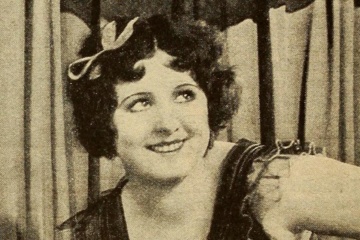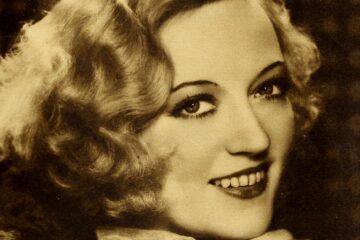

Proof That It’s Pre-Code
- “The Easiest Way” is, oh, hey, getting money and jewelry by spreading your legs.
- Constance Bennett is in her undies. And it’s great.
It’s a Rich Man’s World
“There’s only one thing to do. Laugh it off. Laugh… and get right royally plastered.”
Constance Bennett is, to be blunt, a gorgeous woman. As Lolly Murdoch in The Easiest Way, her character learns a valuable lesson: beauty can get you far, but there are more important things out there.

Hummina wowza.
I’m talking love, people! Yes, this is another tearjerker, where our heroine takes the easy way rather than the right way. Though, to be quite honest, I’m not so sure I’d join in on the scolding Lolly ends up receiving.
But I’m getting incredibly ahead of myself. Our film begins in a crowded apartment filled with a family of seven crammed into three rooms. One bed is shared by three shapely blond sisters, among them Lolly, and they take turns trying to kick each other out of the bed. The patriarch of the family is having trouble finding work, or even trying to find work, so his enterprising children go out to give it their own tries.
Lolly, after refusing the advances of the typical boy next door, gets a job as a model for advertising. This brings her to the attention of executive Will Brockton (Adolphe Menjou). He’s more than a bit of a sadist, as he delights in quickly handing Lolly all of the wealth she never before dreamed of, promising her an open relationship and smiling slyly on the side.

Stuck between two guys. Tough.
That goes out the window when she meets Johnny Madison (Robert Montgomery). He’s an adorable newspaper man about to head off to an assignment in South America. They become smitten instantly, and Lolly promises to move out of Brockton’s lavish apartment and prepare for his return from his assignment.
Brockton doesn’t take this politely– when he said it was an open relationship, he meant for him– and demands the return of all his stuff. Lolly gladly complies.
However, her mom soon becomes ill, and no one has the money to help get her to a specialist. Distraught between that and a lack of communication from Johnny, she slips back to Brockton. Johnny returns to find her back with the other man, and Brockton, infuriated that she hasn’t gotten rid of Johnny, kicks her out as well.
The idea of easy street– that success for beautiful women was only a pair of spread legs away– was a big one in the Depression. The Easiest Way handily condemns this idea, asserting that a woman’s place is to her support a man and not wallow as a plaything.

Charming but brief.
Falling Down Hard
“Even street girls keep promises to the men they love!”
Lolly’s story is contrasted throughout by her sister, Peg (Anita Page), and her new husband Nick (Clark Gable in an early role). Nick is climbing the ropes as a delivery man (back when this was still possible), and treats Laura’s gold digging with open hostility.

The new couple have a conversation away from the camera, AKA the only interesting shot in the entire film.
The film finishes with Lolly, abandoned by both men in her life after they find out that she can’t stay true to either, standing outside her family’s house in the snow. Nick sees her there and, once he finds out that she’s no longer in Brockton’s thrall, invites her in happily.
As her family blushes with joy, Nick tells Lolly that he’s heard about what’s happened with Johnny. He promises her love will be back, but her face shows that she doesn’t think so. In fact, she looks terrified.
The film’s ending is probably it’s most interesting moment (and it certainly took long enough to get there), as it manages to be desperately bleak but warm and hopeful. Family forgives, but Lolly’s already gone too far down the path to find much redemption in any other regard. She’ll have to rebuild from square one.
The Easiest Way best functions as a downbeat companion piece to 1933’s Havana Widows. Whether this indicates that sensibilities evolved (or I suppose devolved) in the intervening years, or if it’s simply a reflection of how the Depression effected what people wanted to see on the big screen.

Clark Gable is good here. But, you know, he’s always good.
There are social discouragements for Gold Diggers, where men with a good dose of pride will reject them. The Easiest Way features two of these men, and it really stacks the deck in this regard. Few movies of this era have so carefully tried to tow the line between love and money, as we watch Bennett squirm and lose loved ones simply because she made the choice to no longer be a sexual object. It’s a striking point.
The film’s rather subtle approach to the duality of the sister’s situations as well as the striking downbeat ending are pretty much the only things to recommend here. Oh, and Robert Montgomery, who’s on screen for about 10 minutes, is abundantly adorable.
But he’s stuffed in the middle of a very, very slow morality play. The Easiest Way is base with its intentions towards Lolly, setting her up either as a rube who doesn’t have enough faith in the power of love or as a fool who should know better than to take the easy way. Blah.
Trivia & Links
- Looks like this is one where me and the 1930’s part ways. This was a big hit, and instrumental in making Bennett a huge star.
- My Love of Old Hollywood delves into Bennett’s career and life, which make for a pretty good read.
- This one has an interesting history. Based on a stage play from 1909, there was a silent version in 1917. When the talkies rolled around, it looks like several studios and producers wanted to take a shot at it again. The Production Code Administration balked. Of course, the movie got made anyway. From TCM:
Finally, M-G-M purchased the story, but not until Columbia had rejected it following the Hays Office’s insistence that the studio use a different title and make changes to bring the story into conformity with the Production Code. By November 1930, producer Irving Thalberg owned the rights to the play, and the Hays Office, after reviewing the M-G-M screen adaptation, informed him that “the trouble with the adaptation is that it builds up audience sympathy for Laura [Lolly] Murdock and supplies her with the means of securing sympathetic excuses for, if not actual approval of, her weakness of character.”
The Hays Office also called the adaptation “much more dangerous than the original play, which for a long time has itself been considered dangerous motion picture material,” and complained that the story did not go “far enough in building up the idea that Laura is being punished.” As a solution to this problem, the Hays Office suggested that the end of film “show Laura in successive steps on her way to the gutter.” In accordance with the suggestion, producer Hunt Stromberg informed the Hays Office that he would insert a scene in which Laura “makes it plain that the life she has been leading has been hideous, destructive, shameful and unhappy.”
- MGM was just starting its kick to promote Clark Gable as a star at this point. This is the second movie he made in 1931 out of thirteen. It was only a few months after this that he appeared so spectacularly in Night Nurse and A Free Soul.


